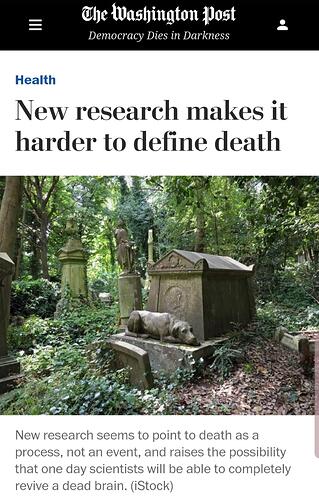Okay, first off I wrote the above under a misapprehension - In my rushed reading, somewhere I got the impression that part of the brain was isolated and it was that which was kept alive. Nope, it was the entire brain. Takes all the steam out of my cool evolutionary perspective take on it.
Still, what was reversed?
The decay of the organism was delayed 4hr, then it was infused with circulating super juice, then some biological/physiological functions were restored on a cellular level, not to the entire organism. What’s really fascinating is the reporting which reflects the only aspect of this that gets people excite. Taking a hint of research and extrapolating potential utopias.
Though it really is an amazing demonstration of how well scientists have come to understand human physiology, and the plumbing that keeps it going. And from the various articles I’ve read this afternoon, seems to me that’s really where this research is going and benefiting, the better preservation of organs after death, using the knowledge for better transpiration and reintroduction into recipient bodies during translate and such …
Pig brains kept alive outside body for hours after death
Hear more about this research on the Nature Podcast : https://www.nature.com/magazine-assets/d41586-019-01216-4/d41586-019-01216-4_16665188.mpga
4:30: “At the cellular level these brains are very close to being alive, But if we consider life of the brain as the expression of the functionality of the brain, then they are very, very far from being alive.”
5:30 - The give IF we can conceive of reversing the damage caused by oxygen deprivation …
———-
https://www.nature.com/articles/d41586-019-01216-4
Sara Reardon, APRIL 17, 2019
Revival of disembodied organs raises slew of ethical and legal questions about the nature of death and consciousness.
Details of the pig-brain experiments appear in a paper1 published on 17 April in Nature (full article is pay for view). Researchers at Yale University in New Haven, Connecticut, hooked the organs to a system that pumped in a blood substitute. The technique restored some crucial functions, such as the ability of cells to produce energy and remove waste, and helped to maintain the brains’ internal structures. …
… Sestan, whose team has used its technique to keep pig brains alive for up to 36 hours, has no immediate plans to try to restore electrical activity in a disembodied organ. Instead, his priority is to find out how long his team can maintain a brain’s metabolic and physiological functions outside the body. “It is conceivable we are just preventing the inevitable, and the brain won’t be able to recover,” Sestan says. “We just flew a few hundred metres, but can we really fly?” …
Disembodied pig brains revived: Your questions answered - Sara Reardon
April 22, 2019
<a href="https://www.nature.com/articles/d41586-019-01289-1">https://www.nature.com/articles/d41586-019-01289-1</a>
From consciousness to cryonics, Nature’s news team answers reader questions about a remarkable piece of research.</blockquote>
